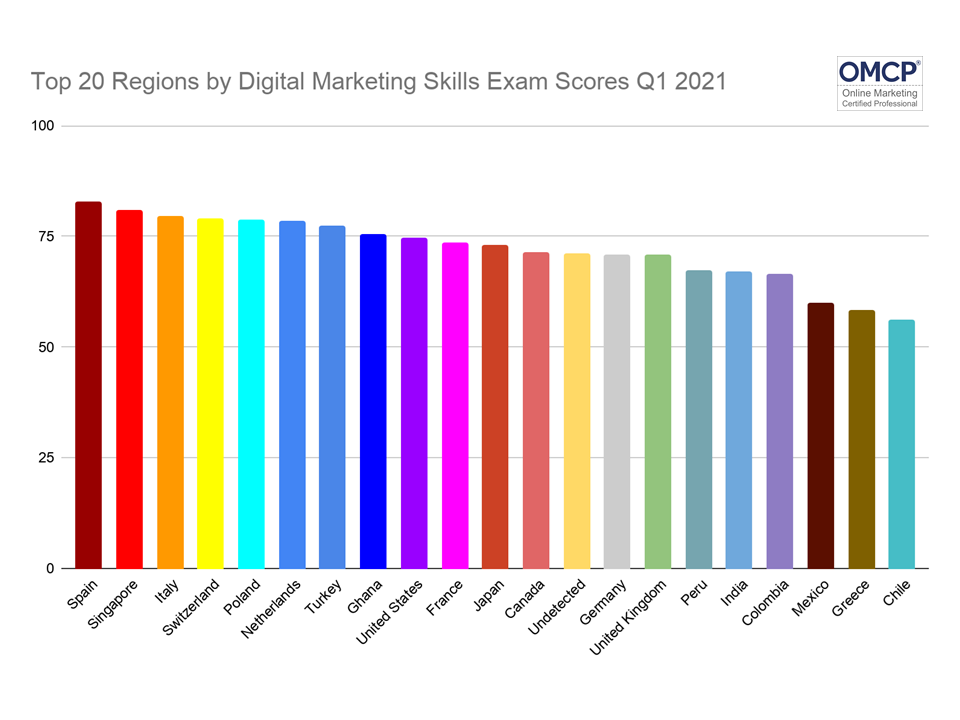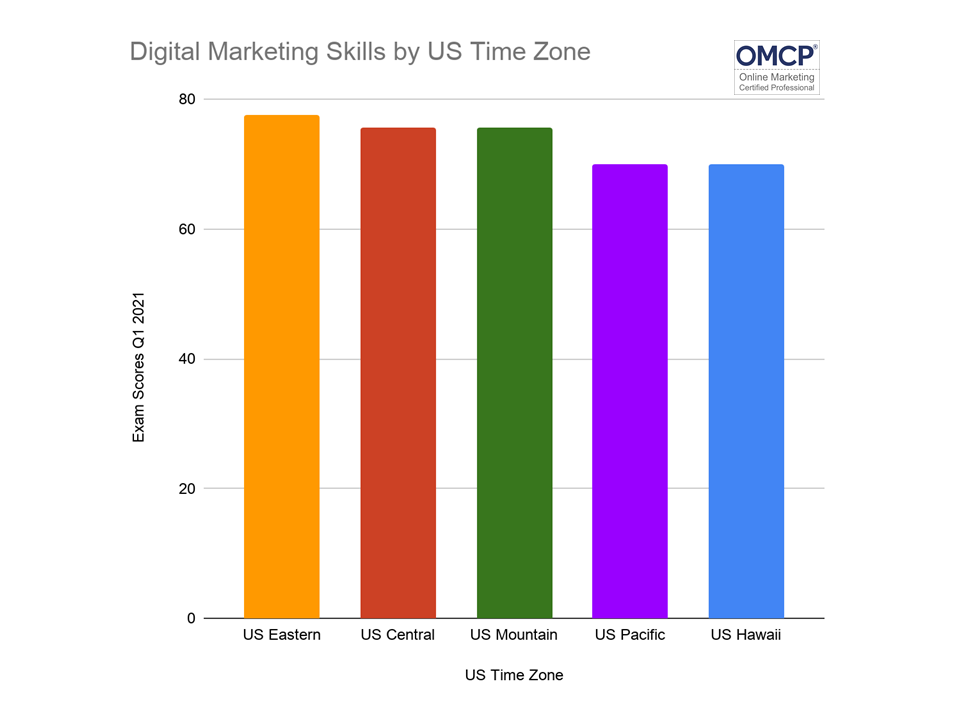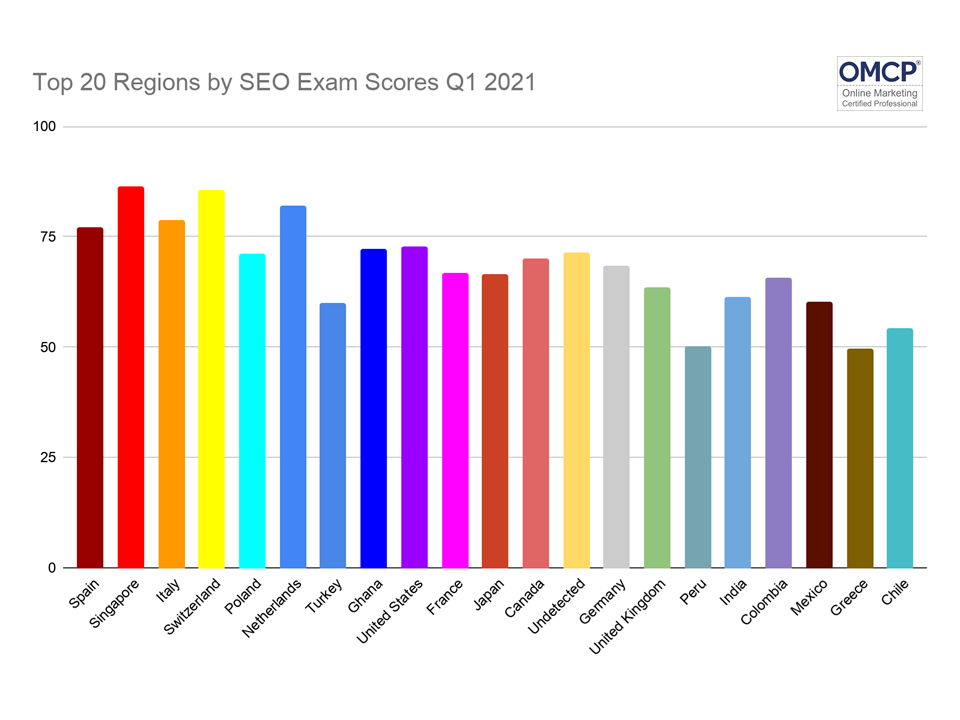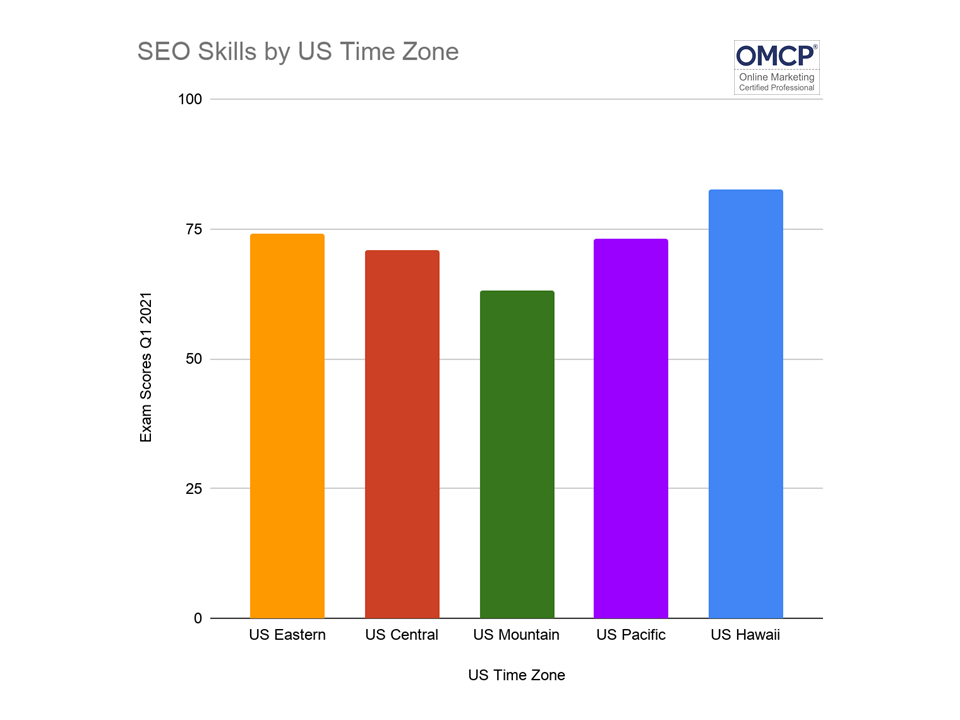Where are the best digital marketers located? In a first release, OMCP is sharing digital marketing skill levels by region as derived from a subset of exams served to thousands of candidates over the last 12 months. OMCP is an independent industry association that verifies digital marketing hard skills via online exams. Certification is awarded by verification of experience, education, exam scores, and training from over 900 providers.
The overall results are first by country and then by US time zone. Navigate to SEO results for that subset. We will add Digital Advertising, Content Marketing, Social Medial Marketing, Digital Analytics, Marketing Automation, Mobile Marketing and Conversion Rate Optimization over the next weeks. Follow OMCP on Twitter to know when the new data is posted. Find the methods and sample size and access to the data here and conditions of use at the end of the post.
Digital Marketing Skills by Country
Eleven countries beat the overall average score of 71.9% with Spain in the lead with its marketers scoring an average of 82.8% for digital marketing skills. Well done Spain! US candidates score an average of 75.6%.

Digital Marketing Skills by US Time Zone
For overall digital marketing skills, the East Coast of the us wins coming in at 77.6% overall. Central and Mountain tie at 75.6%.

SEO Skills by Country
Singapore edges out Switzerland by a tiny 1% difference in SEO, scoring 86.5% vs 85.5%. Both were high volume regions for testing. The US weighs in with a 72.9% score for SEO. Perhaps Switzerland has an unfair advantage with Google’s John Mueller? Cause or correlation? Of course we can’t tell you if John took the test or not 😉

SEO Skills in the US
This could settle the argument, “Are East Coast SEOs better than West Coast SEOs?” The data would appear to say yes. slightly. But the Pacific Island SEOs (Those in Hawaii time zone) show the best skills, scoring an average of 82.6%.

More to Come
We will add Digital Advertising, Content Marketing, Social Medial Marketing, Digital Analytics, Marketing Automation, Mobile Marketing and Conversion Rate Optimization over the next weeks. Follow OMCP on Twitter to know when the new data is posted.
Methods and Sample Size
This data was derived from 1,103 exam instances specifically from a subset of OMCA Practice Exams served over 12 months trailing the date of publication. To protect the privacy of candidates, we omitted a high number of exams that could suggest the performance of a team or a college class undergoing digital marketing readiness testing in a specific region. So for example, if a group of 400 staff from an agency office in Singapore all took the exam, we would eliminate those since, conceivably, someone could derive insights about that team from the reported numbers in that region. This is also why we do not report the number of exams per region, however a region must have at least 10 ‘individual’ (non team) instances to be ranked and then we only included the top 20 regions.
These results do not reflect or include the OMCP Practice Exams, the OMCA Certification Exams or the OMCP Certification exams. The OMCA practice exams serve 24 items, 2-3 per discipline, and the items do not regularly rotate. The items test to the OMCA competencies which verify a concept and component level understanding of the primary digital marketing disciplines. OMCA certification is intended for those who manage marketing teams/programs or must communicate digital marketing concepts. The OMCP exams test for implementation-level skills and are not included in this data. There is an adjustment in the social media scores as one item was in dispute for a low P-Value score and later found to be unreliable within the reporting period. It has since been updated.
The location data is derived from the IP address as reported by queries to http://www.geoplugin.net and can be flawed.
Meant to be Fun and Constructive
This data is intended to be used for analysis, reporting, and lighthearted constructive competition. Much like the international Olympics, we’ve seen that friendly competition to improve performance can help everyone. We’d love to see one region work to perform better than another! We predicted that it is unlikely that harm could come from this. But if we see it being used with malice towards any region, nationality, ethnic group, etc. OMCP will take it down and stop reporting it.
Use of the Data and Attribution
You may use the data if you attribute any use to OMCP, with a link back to OMCP. Since the numbers will change, be sure to stay up to date on changes by following OMCP on twitter. Request access to the data tables here (Google Sheets Shared doc request).